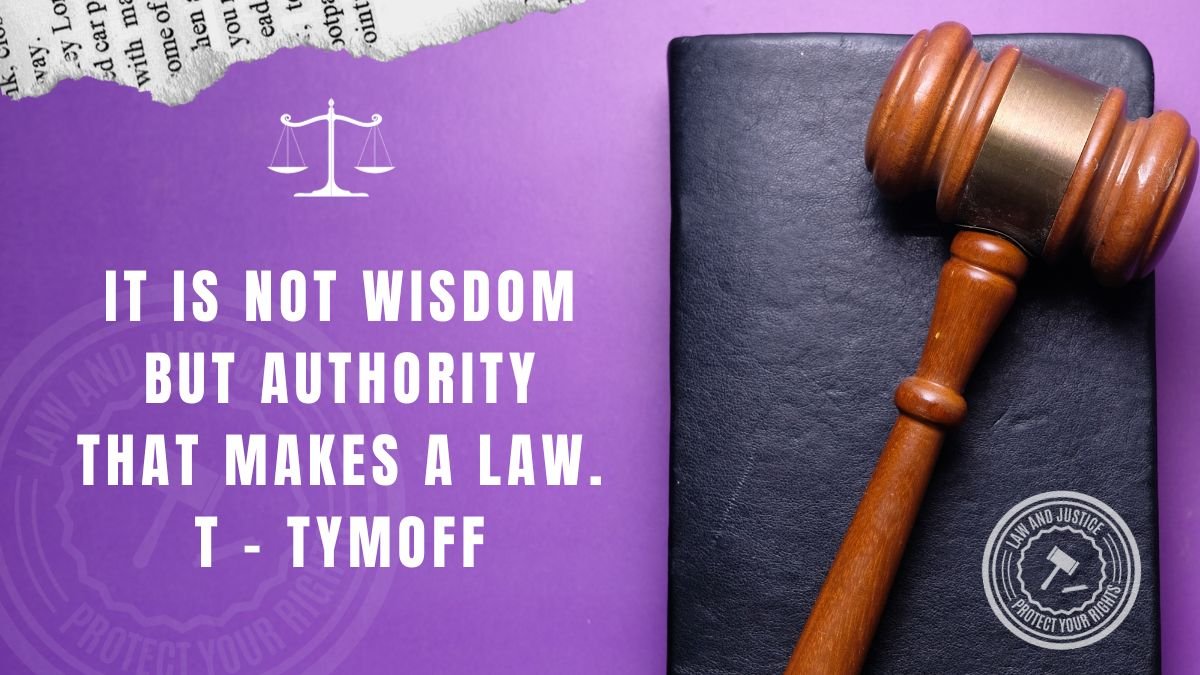Introduction
Have you ever wondered how laws are made and why we follow them? The famous saying, “It is Not Wisdom But Authority That Makes a Law. T – Tymoff,” invites us to explore the intricate relationship between authority and the creation of laws. In this comprehensive article, we will delve into this thought-provoking statement and its implications on our legal systems. By the end, you’ll have a clear understanding of why authority plays a crucial role in shaping and enforcing laws.
What Does T. Tymoff Mean?
Before we delve into the concept of authority in law, let’s unpack T. Tymoff’s statement: “It is Not Wisdom But Authority That Makes a Law.” This statement suggests that laws are not necessarily based on wisdom or moral superiority but are established and enforced through authority. To grasp this idea fully, we need to explore the following aspects:
- Authority in Law
- Definition: Authority in law refers to the power or right vested in a governing body or institution to create, interpret, and enforce laws within a specific jurisdiction.
- Examples: Governments, legislatures, and courts are examples of entities with legal authority. They have the ability to make, interpret, and enforce laws.
- The Legal System
- Components: A legal system comprises various components, including legislative bodies, judiciaries, and law enforcement agencies. These components work together to establish, interpret, and enforce laws.
- Hierarchy: Legal systems often have a hierarchical structure, with higher authorities having more significant influence and power in the creation and interpretation of laws.
It is Not Wisdom But Authority That Makes a Law. T – Tymoff
The Role of Authority in Law

Now that we understand the concept of authority in law, let’s explore its significance:
- Law Creation
- Legislative Authority: Laws are primarily created by legislative bodies, such as parliaments or congresses. These bodies have the authority to draft, debate, and pass laws.
- Representation: The authority of legislators is derived from the people they represent. In democracies, elected representatives make decisions on behalf of their constituents.
- Law Interpretation
- Judicial Authority: Once laws are created, they require interpretation in specific cases. This is where judicial authority comes into play. Courts and judges have the authority to interpret laws and apply them to individual situations.
- Precedent: Judicial decisions often set legal precedents, which guide future interpretations and decisions. This can shape the development of law over time.
- Law Enforcement
- Law Enforcement Agencies: The authority to enforce laws rests with law enforcement agencies, such as police departments. They ensure that individuals and entities comply with the law.
- Authority and Accountability: Law enforcement agencies are granted authority, but they are also held accountable for their actions to prevent abuse of power.
Why Authority Matters
- Order and Stability
- Social Order: Authority in law is essential for maintaining social order and preventing chaos. Laws provide a framework for acceptable behavior in society.
- Conflict Resolution: Legal authorities, such as courts, offer a structured way to resolve disputes and conflicts, contributing to stability.
- Consistency and Fairness
- Uniform Application: Authority ensures consistent application of laws. Without it, laws might be selectively enforced or ignored.
- Protection of Rights: Legal authority is responsible for safeguarding individual rights and ensuring fairness in the justice system.
- Accountability
- Checks and Balances: Authority is often divided among different branches of government to prevent the concentration of power. This system of checks and balances helps maintain accountability.
- Legal Oversight: Oversight bodies and mechanisms exist to monitor and review the actions of authorities to ensure they act within the confines of the law.
Challenges and Controversies
While authority in law serves a crucial role, it is not without its challenges and controversies:
- Abuse of Power
- Tyranny: Excessive authority can lead to tyranny or authoritarian rule, where laws are used to suppress dissent and control the population.
- Human Rights Violations: Abuse of power by authorities can result in human rights violations.
- Conflict of Interest
- Corruption: Authorities may succumb to corruption, undermining the integrity of the legal system.
- Bias: Personal or political biases can influence the decisions of those in authority, leading to unfair outcomes.
Balancing Wisdom and Authority
- Public Participation
- Democracy: In democratic systems, the authority to create and enforce laws is ultimately derived from the people. Public participation, such as voting and advocacy, helps ensure that laws reflect the collective wisdom of society.
- Legal Education
- Legal Experts: Legal experts, including lawyers and judges, bring wisdom and legal expertise to the interpretation and application of laws.
- Legal Reform: Continuous legal education and reform efforts aim to align laws with evolving societal values and wisdom.
You Might Also Like: Love What You Have, Before Life Teaches You to Lov – Tymoff
Conclusion
In conclusion, T. Tymoff’s statement, “It is Not Wisdom But Authority That Makes a Law,” highlights the pivotal role of authority in the creation, interpretation, and enforcement of laws. While wisdom and moral values contribute to the development of laws, it is the authority vested in governing bodies and institutions that gives these laws their binding power. Understanding the delicate balance between authority and wisdom is essential for a just and functional legal system, one that upholds order, fairness, and accountability in society.










